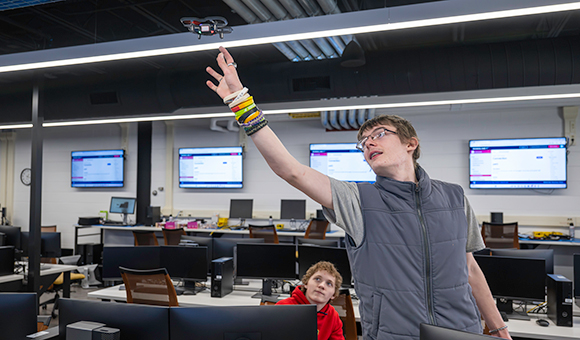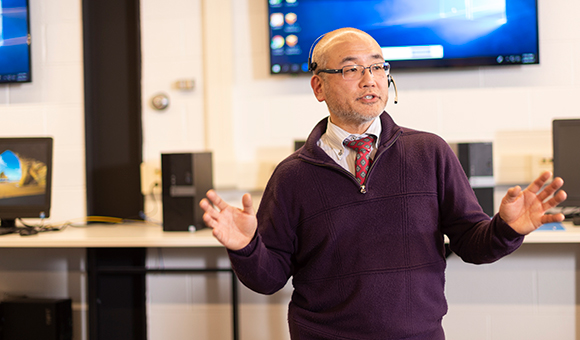

Classroom - This SUNY Canton degree can be earned in a traditional classroom setting.

100% Online - This SUNY Canton degree can be earned entirely online.
Information Technology - B. Tech
The Bachelor of Technology (B.Tech) degree in Information Technology (IT) prepares students for careers in computer systems, networking, and communications. Graduates gain the knowledge and hands-on experience necessary for roles in system and network administration, systems analysis, IT support, and web and application development. The program emphasizes practical learning to equip students with the skills needed to succeed in a wide range of in-demand technology fields. The courses are offered on-campus, online, or in a hybrid format, providing flexible options that accommodate each student’s individual circumstances.

Students in this Major
- Gain extensive hands-on experience in computer hardware, networking, security, web development, and IT applications using multiple platforms.
- Hands-On, Real-World Learning: Gain practical experience using well-equipped, on-site, and remotely accessible campus computers.
- Development of Professional Skills: Emphasis on teamwork and effective communication, essential in today’s IT environments.
- Flexible Degree Options: A variety of electives available for both on-campus and online study.
- Flexible Financial Aid Options: Designed to accommodate different student needs and circumstances.
- Complete a required Capstone Project and have the option to pursue an internship for real-world experience.
Graduates in High Demand
Employment of computer systems analysts is projected to grow 11 percent from 2023 to 2033, much faster than the average for all occupations, according to the U.S. Department of Labor, Bureau of Labor Statistics. Job growth will be driven by the rapid expansion of computer systems design and related services, which is projected to be one of the fastest-growing industries in the U.S. economy.

Employment statistics are from the Bureau of Labor Statistics 2024-2034 Occupational Outlook Handbook.

This career-focused program prepares the go-to professionals for in-demand careers as innovators behind tomorrow’s Information Technology (IT) solutions.
- Tatsuhito Koya, Ph.D.
IT/CIS Curriculum Coordinator
Career Opportunities
- System Analyst
- IT Consultant
- System Administrator
- Network Administrator
- Database Manager
- Web Master
- IT Security Specialist
- IT positions in any industry
Graduates of this program join our team as skilled professionals. They are equipped to excel in complex and challenging roles with confidence, vision, and career-ready IT skills that are sought after in the industry.
- Bryan Eggleston
Alcoa Massena Operations IT Manager

Potential Employers
- Information technology departments within private corporations
- Healthcare organizations and hospital systems
- Manufacturing and engineering firms
- Financial institutions and insurance companies
- Retail and e-commerce businesses
- Government agencies at the local, state, or federal level
- Colleges, universities, and K–12 school districts
- IT consulting and managed service providers
- Nonprofit organizations and community service agencies
- Military and defense-related organizations
Admission Requirements
Apply for free - Prospective students can complete a visit to campus and receive a code at the event to waive their application fee. View campus events.
- Applicants should demonstrate readiness for Intermediate Algebra (MATH 121) and Composition and the Spoken Word (ENGL 101). Incoming freshmen will be assessed for appropriate placement in English and math courses.
- High school computer coursework is beneficial but not required for admission.
- Transfer applicants must have a minimum cumulative GPA of 2.0.
- Meeting all prerequisites is recommended; however, applicants who do not meet them may still be admitted. In such cases, additional coursework may be required, potentially extending the program beyond two years.

PROGRAM REQUIREMENTS (Curriculum 2045)
The following shows the typical course sequence and program requirements.
Semester I Credits
| Prefix | Course Name | Credits |
|---|---|---|
| BSAD 100 | Introduction to Business | 3 |
| CITA 152 | Computer Logic | 3 |
| CITA 163 | Survey of Information Technology | 3 |
| ENGL 101 | Composition and the Spoken Word | 3 |
| MATH Elective4 | 3 | |
| TOTAL CREDITS | 15 |
Semester II Credits
| Prefix | Course Name | Credits |
|---|---|---|
| CITA 170 | Computer Concepts & Operation Systems | 3 |
| CITA 171 | Operating System Fundamentals | 3 |
| CITA 175 | Computer Concepts & OS Lab3 | 1 |
| MATH 141 | Statistics | 3 |
| GER - DEISJ Elective | 3 | |
| GER - Natural Science Elective | 3 | |
| TOTAL CREDITS | 16 |
Semester III Credits
| Prefix | Course Name | Credits |
|---|---|---|
| CITA 180 | Introduction to Programming | 4 |
| CITA 215 | Database Concepts & Applications | 3 |
| CITA 220 | Data Communications & Network Technology | 3 |
| CITA 221 | Data Communications & Network Technology Lab3 | 1 |
| ECON 101 ECON 103 |
Macroeconomics OR Microeconomics |
3 |
| General Elective (7, 8, 9, 10, or 11) | 3 | |
| TOTAL CREDITS | 17 |
Semester IV Credits
| Prefix | Course Name | Credits |
|---|---|---|
| CITA 204 | Systems Analysis and Design** | 3 |
| CYBR 250 | Information Security | 3 |
| GER Elective (7, 8, 9, 10, or 11) | 3 | |
| GER Elective | 3 | |
| GER Elective | 3 | |
| TOTAL CREDITS | 15 |
Semester V Credits
| Prefix | Course Name | Credits |
|---|---|---|
| ACCT 101 | Foundations of Financial Accounting | 4 |
| BSAD 301 | Principles of Management | 3 |
| CITA 300 | Management Information Systems | 3 |
| CITA 310 | Web Server Administration | 3 |
| SOET 361 | Project Management | 3 |
| TOTAL CREDITS | 16 |
Semester VI Credits
| Prefix | Course Name | Credits |
|---|---|---|
| ECON 370 | Engineering Economics | 3 |
| Program Elective - CITA/CYBR/DATA/GMMD/GAME | 3 | |
| Program Elective - CITA/CYBR/DATA/GMMD/GAME | 3 | |
| Program Elective - CITA/CYBR/DATA/GMMD/GAME | 3 | |
| U/L Program Elective - CITA/CYBR/DATA/GMMD/GAME | 3 | |
| TOTAL CREDITS | 15 |
Semester VII Credits
| Prefix | Course Name | Credits |
|---|---|---|
| CYBR 440 | Network Management | 3 |
| CITA 441 | Network Management Lab | 1 |
| U/L Program Elective - CITA/CYBR/DATA/GMMD/GAME | 3 | |
| U/L Program Elective | 3 | |
| U/L Liberal Arts Elective | 3 | |
| General Elective | 3 | |
| TOTAL CREDITS | 16 |
Semester VIII Credits
| Prefix | Course Name | Credits |
|---|---|---|
| CITA 330 | Emerging IT Applications | 3 |
| CITA 460 | IT & Networked Economy | 3 |
| CITA 480 | Internship in Information Technology OR 2-Program Electives4 |
6 |
| SOET 477 | Capstone Project | 3 |
| TOTAL CREDITS | 12 |
U/L = Upper Level Courses (300/400)
GER = General Education Requirement
Note:
- To be eligible for graduation, all CITA courses must be completed with a grade of C or higher, or must be accepted as transfer credits.
- A maximum of three (3) CITA credits from courses numbered below CITA 150 can be counted towards graduation.
- Online students can substitute CITA 175 and CITA 221 credits with two (2) lower-level program elective credits (CITA/CYBR/DATA). CITA 441 credits can be substituted with one (1) upper-level program elective credit. Alternatively, all three credits can be substituted with a 3-credit upper-level program elective course (CITA/CYBR/DATA).
- The minimum qualifying math course is MATH 121, a GER 4 course. It can be substituted with a higher-level GER 4 math course.
Information Technology
Tatsuhito Koya, Ph.D.
Associate Professor & Program Coordinator
315-386-7362
koyat@canton.edu
Office of Admissions
French Hall
SUNY Canton
34 Cornell Drive
Canton, NY 13617
(315) 386-7123 or
1-800-388-7123
Fax: (315) 386-7929
admissions@canton.edu
transfer@canton.edu
Financial Aid
One-Hop Shop
315-386-7616
finaid@canton.edu

